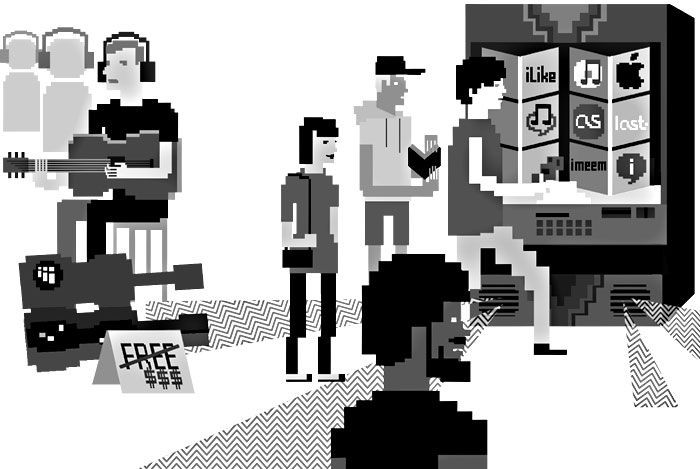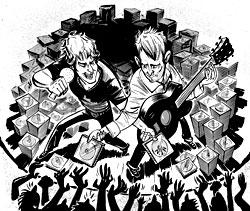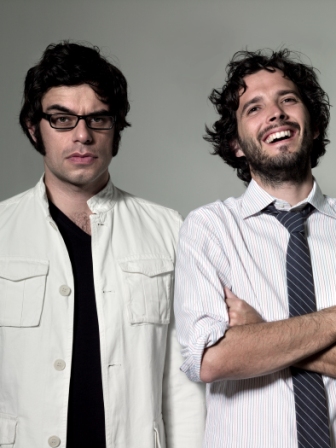If musicians in person are their CDs incarnate, what would it be like to meet Hands Across the Void?
You’d think from the ghostly, crackling sounds that Jesy Fortino, the 24-year-old singer-songwriter masquerading onstage as Tiny Vipers, would be a sort of hybrid between Karen Dalton and Joanna Newsom. From the androgynous press photos, you’d deem Sub Pop’s newest entry into the bleak songstress category to be ethereal. Weird. Skeletal. Mythological. Strong, yet fragile. Stuck in some past. All of those bullshit adjectives.
But you pass by her after entering Six Arms, thinking her just another 24-year-old with a colorful telescope tattooed on her left inner forearm, nestled at the bar drinking iced tea on a Tuesday afternoon. She has blue-gray eyes, long brown hair, a dark purple Freshjive shirt, black pants, and two bands tattooed around her right biceps. You pass by her because she’s pretty and normal.
And maybe a little shy. “I don’t mind explaining myself to people, if people want to know,” she says. “But I definitely think there’s more interesting people to interview. They might just be a dishwasher. But they might not play at the Triple Door, so people don’t want their opinion.”
After prying—her voice in person, as in song, is warbly, wounded, and hushed—you find out that she grew up in San Antonio, left when she was 8, then spent time in Renton, Oakland, and Tucson before moving back to Seattle four years ago. “I like how close to the woods and the water it is,” she says, claiming to not feel a kinship with nature, though her lyrics say otherwise. But she doesn’t like how expensive it is. “I might have to move to a cheaper city.” She lives with six other people in a house over by the Seattle University campus, and has worked at Bimbo’s for the past three and a half years, but is seeking a change. “I mean, I’m quitting, but I come in if they still need me. But I’m still working at the bar.”
You find out she’s used to the comparisons. “That’s the one I get compared to a lot,” she says of Newsom. “She’s a weird girl, I’m a weird girl. So I guess we’re the same,” she laughs.
Her short career has been marked by inconsistent shows.
“At first, you just play shows to play shows. Then after a while, you have to assess why you’re doing music constantly. You have to pick and choose. That’s why the Triple Door will be a good venue—people will be sitting and expecting a mellow show. If it’s the right audience, I really enjoy playing live. I really enjoy playing shows—it’s honest, and it feels good.”
There is an exception to the feel-good rule, notably larger, drinking crowds and what she calls her worst show, when she opened for DeVotchka at Neumo’s. “It was horrible. Everybody was talking—I didn’t even want me to play. They’re all here to party and have fun, and I’m singing songs about death. They call me a nihilist, but I’m not a nihilist. I don’t think I am.” So what is she exactly? “I don’t know,” she says. “I don’t believe in destroying everything.”
She believes in creating, which must come from somewhere, so when asked what she’s reading, she plops her black messenger on the table and pulls out a tattered, coverless copy of Hard-Boiled Wonderland and the End of the World, by Haruki Murakami. “Wild Sheep Chase is my favorite. Man, it was good,” she says of the Japanese novelist’s surreal short-fiction masterpiece.
When asked what she’s listening to, she pulls out a stack of CDs: Joy Division; West Coast Pop Art Experimental Band, Vol. 3; Dr. Octagon; Svarte Greiner, Knive; the Incredible String Band, The 5000 Spirits or the Layers of the Onion; the psychedelic compilation Trap Door; Michael Cashmore, Sleep England; Tower by Circle featuring Verde; Classic Yes by Yes; Current 93 ,Thunder Perfect Mind; An Electric Storm by the White Noise. They’re all weird and good, like her music, lullabies serving as precursors to nightmares, replete with distortion, though her new sounds cling to even less than the present moment. “The new stuff I’m doing is completely different from [Hands Across the Void]. It’s more free-form, a little weirder. I think I’m just going to hang out and play for as long as I’ve wanted and then move on when it’s over. Life is always moving, and I just move along with it. I just embrace that. If it’s popular or not, I’m going to have fun with it. I’m not trying to hold on to anything.”
“I guess I am a bit Buddhist,” she smiles. “I try not to be nostalgic about things—I think that’s the biggest cause of pain…when you try to hold on to things. You can either go with it and have fun for a few years, or spend the rest of your life trying to maintain it. People go nuts. I’ve seen people go crazy trying to latch onto every little Pitchfork thing. You can’t latch onto anything or you’ll go nuts. If you look at rock stars, they’re flipping insane. They do crazy shit. They pick up a magazine, and they’re like, ‘That’s a reflection of me.’ But it’s not—to the untrained eye, it is. It’s feedback…it’s something running through itself to the point where it warps.”
But when she tells you about the first review she got, one after she played in Portland a few years ago, you find out just how true that is for her. “For some reason the writer, Michael Byrne, tore me apart. But of course it was bad—it was one of my first shows. It kind of knocked me down, because also it made me learn that criticism doesn’t mean anything, unless it comes from someone I really respect.”
If you had that guy’s number (as I happened to, Byrne being a former Willamette Week colleague), you’d give it to her in a heartbeat. “I’ve been waiting to talk to him for three years….” Her warbly voice perks up and she happily hunches over her cell, entering the number into her phone before talking about how being torn apart forced her to rebuild herself. If musicians are their CDs incarnate, you’ve already missed the chance to meet anyone resembling Hands Across the Void.
“Who knows what’s going on? Nobody’s an authority on anything. You just have to listen to yourself, I guess, and even then, your self is changing constantly. I’ll be bummed out about something, and then a week later, I’m fine. That’s a mystery, why that is.”








